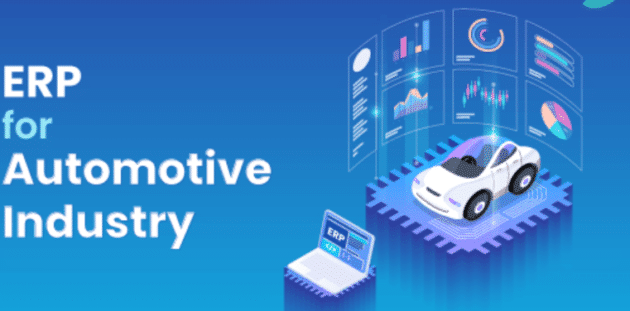Automotive ERP Software: Driving Efficiency and Innovation in the Automotive Industry – The automotive industry is one of the most dynamic and complex sectors, with a constant demand for innovation, quality, and cost efficiency. Automotive companies face unique challenges, such as managing large supply chains, adhering to stringent regulatory requirements, and responding quickly to market trends. To navigate these challenges and streamline operations, many automotive businesses are turning to Automotive ERP software (Enterprise Resource Planning) to optimize processes, enhance decision-making, and drive growth. By integrating various business functions into a single system, Automotive ERP software enables companies to stay competitive in a fast-paced environment.

What is Automotive ERP Software?
Automotive ERP software is a specialized type of enterprise resource planning solution designed specifically for the needs of the automotive industry. It integrates various processes and functions within an automotive business, including manufacturing, supply chain management, inventory control, quality assurance, financials, and customer relationship management (CRM). The software provides a centralized platform where data is accessible across departments, enabling seamless communication and collaboration. By automating repetitive tasks and providing real-time insights, Automotive ERP software helps companies improve efficiency, reduce costs, and enhance product quality.
Key Features of Automotive ERP Software
Automotive ERP software is equipped with a range of features tailored to meet the unique demands of the automotive sector. These features help manufacturers, suppliers, and distributors manage their operations effectively:
- Manufacturing Management
Automotive ERP software supports the entire manufacturing process, from planning and scheduling to production and quality control. It provides tools for managing production workflows, tracking work orders, monitoring machine performance, and ensuring that manufacturing processes meet industry standards. With real-time data on production status, companies can quickly identify and resolve issues, minimizing downtime and reducing production costs. - Supply Chain and Inventory Management
Efficient supply chain management is critical in the automotive industry, where timely delivery of components is essential to keep production lines running. Automotive ERP software facilitates supply chain coordination by tracking inventory levels, managing supplier relationships, and automating procurement processes. The system provides real-time visibility into the supply chain, allowing companies to optimize inventory levels, reduce excess stock, and avoid production delays due to material shortages. - Quality Management
Automotive companies must adhere to stringent quality standards to ensure that products meet customer expectations and regulatory requirements. Automotive ERP software includes quality management features that help track quality metrics, monitor compliance, and conduct inspections throughout the production process. Automated quality checks and non-conformance reporting help identify defects early, preventing defective products from reaching customers. - Financial Management and Costing
Financial management is an integral part of running a successful automotive business. Automotive ERP software integrates financial processes such as accounting, budgeting, and payroll, providing a comprehensive view of the company’s financial health. Costing tools within the ERP system help automotive companies calculate product costs accurately, manage budgets, and analyze profit margins. This information supports financial planning and ensures that the company remains financially stable. - Customer Relationship Management (CRM)
Managing customer relationships is crucial in the automotive industry, where customer satisfaction can greatly impact brand loyalty. Automotive ERP software often includes CRM features that help companies track customer interactions, manage sales pipelines, and handle after-sales service. With a better understanding of customer needs and preferences, companies can offer personalized services and respond quickly to customer inquiries. - Regulatory Compliance and Reporting
The automotive industry is highly regulated, with specific standards for safety, emissions, and quality. Automotive ERP software helps companies comply with regulations by maintaining accurate records, automating reporting processes, and ensuring that manufacturing practices meet legal requirements. The system also supports traceability by tracking components and materials throughout the supply chain, which is essential for recalls and regulatory audits. - Product Lifecycle Management (PLM)
Automotive ERP software supports product lifecycle management by integrating design, engineering, and manufacturing processes. The software helps manage product data, track changes, and ensure that designs meet industry standards. PLM features facilitate collaboration between teams, streamline product development, and shorten time-to-market for new models. - Advanced Analytics and Reporting
Automotive ERP solutions come with advanced analytics and reporting capabilities that allow companies to analyze key performance indicators (KPIs), identify trends, and make data-driven decisions. Reports on production efficiency, inventory turnover, sales performance, and financial health provide valuable insights that can be used to improve operational efficiency and strategic planning.
Benefits of Implementing Automotive ERP Software
The implementation of Automotive ERP software offers numerous benefits that help automotive companies overcome industry-specific challenges and drive growth:
- Increased Operational Efficiency
Automotive ERP software automates many manual processes, such as order processing, inventory tracking, and financial reporting. By reducing the need for manual data entry and eliminating redundant tasks, the software frees up staff to focus on more strategic activities. Automated workflows ensure that tasks are completed more quickly and consistently, leading to greater operational efficiency. - Improved Production Planning and Scheduling
With real-time data on production capacity, material availability, and labor resources, Automotive ERP software helps companies plan and schedule production more effectively. The software can identify potential bottlenecks, optimize resource allocation, and ensure that production schedules are met. This improves on-time delivery rates and reduces the risk of production disruptions. - Enhanced Quality Control
Automotive ERP software supports rigorous quality management practices by providing tools for tracking quality metrics, conducting inspections, and documenting compliance. This helps companies detect and address quality issues early in the production process, reducing the likelihood of costly recalls and warranty claims. Maintaining high-quality standards also strengthens customer trust and brand reputation. - Cost Reduction and Profitability Improvement
By optimizing inventory levels, reducing waste, and automating procurement processes, Automotive ERP software helps companies reduce costs. The software’s financial management tools provide insights into cost drivers and profit margins, allowing companies to identify opportunities for cost savings. Improved cost control and efficient resource management contribute to higher profitability. - Better Decision-Making through Data-Driven Insights
Automotive ERP software provides a centralized source of accurate and up-to-date information, which supports data-driven decision-making. Advanced analytics and customizable reports help companies monitor KPIs, analyze trends, and identify areas for improvement. This enables management to make informed decisions that enhance business performance and competitiveness. - Regulatory Compliance and Risk Mitigation
Automotive ERP software simplifies compliance with industry regulations by automating the documentation and reporting processes. The system ensures that all manufacturing and quality standards are met, reducing the risk of non-compliance. In the event of a recall, traceability features allow companies to quickly identify affected products and respond effectively, minimizing reputational damage and legal liabilities. - Scalability and Adaptability
As automotive companies grow or diversify their product offerings, Automotive ERP software can be scaled to accommodate new requirements. The software’s modular design allows companies to add or modify features as needed, ensuring that the system remains aligned with business objectives. This flexibility supports long-term growth and helps companies adapt to changing market conditions.
Challenges in Implementing Automotive ERP Software
Despite the many benefits, implementing Automotive ERP software can pose certain challenges:
- High Initial Investment
The cost of implementing an Automotive ERP system can be substantial, particularly for small and medium-sized enterprises (SMEs). Expenses may include software licensing, hardware upgrades, data migration, and training. However, the long-term cost savings and operational improvements often outweigh the initial investment. - Complexity in Customization and Integration
Automotive companies may have specific requirements that necessitate customization of the ERP system. Additionally, integrating the ERP software with existing systems, such as CAD tools, manufacturing execution systems (MES), or legacy databases, can be complex and time-consuming. Customization and integration efforts may increase costs and delay the implementation timeline. - Data Migration and System Transition
Migrating data from legacy systems to a new ERP platform requires careful planning to avoid data inconsistencies and loss. Inaccurate data migration can lead to disruptions in operations and affect decision-making. Companies must ensure that data is cleaned, validated, and mapped correctly during the transition. - Training and Change Management
Introducing a new ERP system requires employees to learn how to use the new software effectively. Inadequate training can result in low user adoption and reduced system utilization. Organizations should invest in comprehensive training programs and employ change management strategies to help staff adapt to the new system.
The Future of Automotive ERP Software
The evolution of Automotive ERP software is driven by advancements in technology and changing industry needs. Key trends shaping the future of Automotive ERP include:
- Cloud-Based ERP Solutions
The adoption of cloud-based ERP systems is increasing due to their scalability, cost-effectiveness, and ease of access. Cloud solutions allow automotive companies to access the ERP system from anywhere, facilitate remote work, and reduce the need for on-premise infrastructure. Regular updates and improved data security are additional benefits of cloud deployment. - Integration of Artificial Intelligence (AI) and Machine Learning (ML)
AI and ML technologies are being integrated into Automotive ERP software to enhance predictive analytics, automate repetitive tasks, and improve quality control. These technologies enable the system to predict maintenance needs, optimize inventory levels, and detect quality issues in real time. - Internet of Things (IoT) Integration
IoT devices, such as connected sensors and smart machinery, can be integrated with Automotive ERP systems to provide real-time data on production status, equipment health, and inventory levels. IoT integration supports predictive maintenance, reduces downtime, and enhances supply chain visibility. - Focus on Sustainability
As the automotive industry shifts toward sustainable practices, Automotive ERP software is evolving to support eco-friendly initiatives. Features for tracking energy consumption, managing emissions, and optimizing resource usage help companies meet sustainability goals and comply with environmental regulations.

